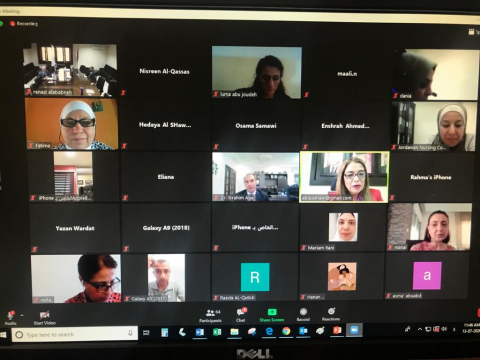

The Higher Population Council, in cooperation with UNFPA, held on Monday a national webinar in celebration of World Population Day, which is based this year on the theme of “Safeguarding the Health and Rights of women and Girls during Covid-19”.
Attended by national stakeholders, the webinar overviewed the role of HPC in addressing challenges faced by different population groups as a result of the Covid-19 pandemic, discussed the social protection framework and how it has been affected by Covid-19 and also discussed reproductive health information and services provided by the Ministry of Health during and after the pandemic. Also during the webinar, the findings of a study entitled “an assessment of the current situation of sexual and reproductive health and reproductive rights awareness programs for adolescents and youth in Jordan” were released.
HPC Secretary General, Dr. Abla Amawi, said during the webinar that HPC has played a vital role in supporting government efforts in responding to Covid-19 through giving online presentations on in-depth studies about the impact of Covid-19 on various sectors and population groups, particularly the vulnerable, to help decision-makers develop strategic plans that address Covid-19 impact. Dr Amawi also highlighted the key role HPC plays in identifying gaps and priorities that need to be taken into consideration when developing future crisis management plans to support different population groups.
On the other hand, UNFPA Country Representative in Jordan, Enshrah Ahmed, said that UNFPA focuses on raising awareness, providing SRH & RR services, and supporting women and girls during Covid-19, particularly in the field of gender-based violence. “UNFPA seeks to keep sexual and reproductive health rights on top of the national agenda and explore ways to maintain the achieved gains and make progress towards SDGs by 2030 as demonstrated during the Nairobi Summit last year, “ Ahmed added.
At the webinar, the Secretary General of the National Council for Family Affairs, Dr. Mohammad Meqdadi, said that NCFA seeks to institutionalize a family protection framework by developing a collaborative national work mechanism that brings together all governmental and non-governmental actors in the field of family protection. Dr. Meqdadi explained that the mechanism covers the national framework for family protection against violence, and the standard operating procedures for prevention of and response to cases of violence in Jordan, which organize coordination and partnerships and define the roles and responsibilities of sectors in handling cases of violence. Dr. Meqdadi added that NCFA works with the National Taskforce for Family Protection to monitor and evaluate the compliance of institutions with national standards and policies, enhance and facilitate coordination among concerned agencies, and develop national family protection principles and mechanisms.
On the other hand, the Director of Family Health Institute - King Hussein Foundation, Dr. Ibraheem Aqel, highlighted the role of CSOs in generally addressing population-related issues and in supporting the government of Jordan to combat the pandemic by providing information, raising awareness and ensuring continuous service delivery in the field of maternal and child health, chronic diseases, mental health, psychosocial protection and support, rehabilitation and support for persons with disabilities, aid and subsistence support, economic empowerment and legal services to benefit many vulnerable groups, including the refugees, during the lockdown.
MOH Maternal and Child Health Director, Dr. Malak Al Ouri, stressed the Government of Jordan has taken proactive and precautionary measures under the directives of His Majesty King Abdullah II bin Al Hussein that since the start of the crisis to limit the spread of Covid-19. She explained that the healthcare system has effectively managed to control and contain the spread of infection by responding directly to the pandemic while ensuring uninterrupted access to basic healthcare services at the same time.
HPC Senior Researcher, Ghaleb Al Azzeh, presented the findings of the study conducted by HPC with support from Share-Net Jordan entitled “an Assessment of the Current Situation of Adolescent and Youth SRH &RR Awareness Programs in Jordan”. The study aims to identify the role and spread of awareness programs in the governorates of Jordan and assess the quality of and gaps in programs and manuals, and identify the reproductive health awareness needs and challenges facing youth in this field.
The study revealed that Jordan lacks a standardized and sustainable national program embedded in institutional strategies and plans to offer adolescent and youth reproductive health awareness programs, and explained that the majority of the currently implemented programs are neither comprehensive nor specialized in adolescent and youth SRH, are not sensitive to the needs of specific youth age groups and are not sustainable as they rely on limited-time funding support. Moreover, many of the existing adolescent and youth SRH awareness programs lack monitoring and evaluation systems.
The study made recommendations to establish a national (multi-sectoral) coordination mechanism, identify a national umbrella to unify fragmented efforts and enhance coordination, develop a national adolescent and youth SRH awareness program that meets different needs according to age and gender and conforms to the principles of Islam and the Jordanian culture. The study also recommended developing a national hands-on training toolkit that links acquired knowledge to life skills and developing a national training of trainers program (TOT) to qualify specialized trainers in youth-related issues.







